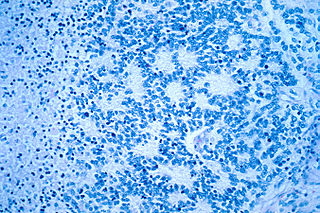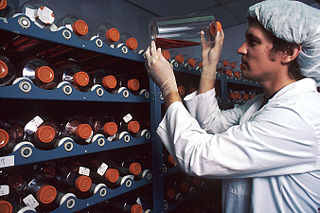
Ray Kruse Iles is a biomedical scientist who was head of the Williamson Laboratory for Molecular Oncology at St Bartholomew's Hospital in London. [1]

Ray Kruse Iles is a biomedical scientist who was head of the Williamson Laboratory for Molecular Oncology at St Bartholomew's Hospital in London. [1]
Iles has a particular interest in the interface between rational processing, emotional motivation and endocrinology. [2]
He co-founded the ELK-Health Foundation, with psychotherapist Tadhg Ó Séaghdha, in 2004. The ELK-Foundation Health (named after Iles's father, Eric Leonard Kruse) is now the National Institutes for Stress, Anxiety and Depression (NISAD), centred in Lund, Sweden. It still uses the ELK-Health name in its programmes and clinics, which support people needing to change habits that harm their physical and emotional health.
Iles's interest in women's and reproduction health led him, in 2011, to become the founding director of the biomarker diagnostic company MAPSciences. [3]
Iles is the inventor of new diagnostic technology, six clinical screening tests for pregnancy disorders and Downs Syndrome/prenatal diagnosis, [4] [5] [6] [7] [8] [9] haemoglobinopathies, thalassemia, [10] and diabetes, [11] and two cancer-related patents. [12] [13]
His academic career, after leaving St Bartholomew's, included being Professor of Biomedical Science at Middlesex University heading a Biomedical Science Research Facility, which incorporated molecular pathology, bio-modelling/bioinformatics and environmental health, [14] [15] and then Anglia Ruskin University. [16]
Formerly a regular contributor to Kumar and Clark's Clinical Medicine, [17] Iles left academia to concentrate on the two organisations that he co-founded, NISAD and MapSciences.
In 2012, with Suzanne Docherty, he published the textbook Biomedical Science: Essential Laboratory Medicine. [5]
NISAD has supported several research projects of Iles and his students in bioanalysis, [18] cancer research, [19] [20] fertility [21] and prenatal care and child development. [22] [23] [24]
In 2019 Iles became founding dean at Abu Dhabi University’s College of Health Sciences. In July 2020 he became Visiting Professor at the Laboratory of Viral Zoonotics, University of Cambridge. [25]
As a boy Iles attended Mellow Lane Comprehensive School in Hayes, Middlesex. [26]
His cousin is the UK Olympic fencer Richard Kruse, which was the subject of the BBC Radio programme Tracing your Roots. [25]

Small-cell carcinoma is a type of highly malignant cancer that most commonly arises within the lung, although it can occasionally arise in other body sites, such as the cervix, prostate, and gastrointestinal tract. Compared to non-small cell carcinoma, small cell carcinoma is more aggressive, with a shorter doubling time, higher growth fraction, and earlier development of metastases.

Glioblastoma, previously known as glioblastoma multiforme (GBM), is the most aggressive and most common type of cancer that originates in the brain, and has very poor prognosis for survival. Initial signs and symptoms of glioblastoma are nonspecific. They may include headaches, personality changes, nausea, and symptoms similar to those of a stroke. Symptoms often worsen rapidly and may progress to unconsciousness.

Metabolomics is the scientific study of chemical processes involving metabolites, the small molecule substrates, intermediates, and products of cell metabolism. Specifically, metabolomics is the "systematic study of the unique chemical fingerprints that specific cellular processes leave behind", the study of their small-molecule metabolite profiles. The metabolome represents the complete set of metabolites in a biological cell, tissue, organ, or organism, which are the end products of cellular processes. Messenger RNA (mRNA), gene expression data, and proteomic analyses reveal the set of gene products being produced in the cell, data that represents one aspect of cellular function. Conversely, metabolic profiling can give an instantaneous snapshot of the physiology of that cell, and thus, metabolomics provides a direct "functional readout of the physiological state" of an organism. There are indeed quantifiable correlations between the metabolome and the other cellular ensembles, which can be used to predict metabolite abundances in biological samples from, for example mRNA abundances. One of the ultimate challenges of systems biology is to integrate metabolomics with all other -omics information to provide a better understanding of cellular biology.

In medicine, proton therapy, or proton radiotherapy, is a type of particle therapy that uses a beam of protons to irradiate diseased tissue, most often to treat cancer. The chief advantage of proton therapy over other types of external beam radiotherapy is that the dose of protons is deposited over a narrow range of depth; hence in minimal entry, exit, or scattered radiation dose to healthy nearby tissues.

Hereditary nonpolyposis colorectal cancer (HNPCC) or Lynch syndrome is an autosomal dominant genetic condition that is associated with a high risk of colon cancer as well as other cancers including endometrial cancer, ovary, stomach, small intestine, hepatobiliary tract, upper urinary tract, brain, and skin. The increased risk for these cancers is due to inherited genetic mutations that impair DNA mismatch repair. It is a type of cancer syndrome. Because patients with Lynch syndrome can have polyps, the term HNPCC has fallen out of favor.

Neuroblastoma (NB) is a type of cancer that forms in certain types of nerve tissue. It most frequently starts from one of the adrenal glands but can also develop in the head, neck, chest, abdomen, or spine. Symptoms may include bone pain, a lump in the abdomen, neck, or chest, or a painless bluish lump under the skin.

Lenalidomide, sold under the brand name Revlimid among others, is a medication used to treat multiple myeloma, smoldering myeloma, and myelodysplastic syndromes (MDS). For multiple myeloma, it is used after at least one other treatment and generally with dexamethasone. It is taken by mouth.

Medical research, also known as experimental medicine, encompasses a wide array of research, extending from "basic research", – involving fundamental scientific principles that may apply to a preclinical understanding – to clinical research, which involves studies of people who may be subjects in clinical trials. Within this spectrum is applied research, or translational research, conducted to expand knowledge in the field of medicine.
In biomedical contexts, a biomarker, or biological marker, is a measurable indicator of some biological state or condition. Biomarkers are often measured and evaluated using blood, urine, or soft tissues to examine normal biological processes, pathogenic processes, or pharmacologic responses to a therapeutic intervention. Biomarkers are used in many scientific fields.

Transitional cell carcinoma, also called urothelial carcinoma, is a type of cancer that typically occurs in the urinary system. It is the most common type of bladder cancer and cancer of the ureter, urethra, and urachus. Symptoms of urothelial carcinoma in the bladder include hematuria. Diagnosis includes urine analysis and imaging of the urinary tract (cystoscopy). Transitional cell carcinomas arise from the transitional epithelium, a tissue lining the inner surface of these hollow organs. When the term "urothelial" is used, it specifically refers to a carcinoma of the urothelium, meaning a transitional cell carcinomas of the urinary system.
The Pennington Biomedical Research Center is a health science-focused research center in Baton Rouge, Louisiana. It is part of the Louisiana State University System and conducts clinical, basic, and population science research. It is the largest academically-based nutrition research center in the world, with the greatest number of obesity researchers on faculty. The center's over 500 employees occupy several buildings on the 222-acre (0.90 km2) campus. The center was designed by the Baton Rouge architect John Desmond.

The Society of Nuclear Medicine and Molecular Imaging (SNMMI), formerly the Society of Nuclear Medicine, is a nonprofit scientific and professional organization that promotes the science, technology and practical application of nuclear medicine and molecular imaging. SNMMI's mission is to improve human health by advancing molecular imaging and therapy.
The American Society of Clinical Oncology (ASCO) is a professional organization representing physicians of all oncology sub-specialties who care for people with cancer. Founded in 1964 by Fred Ansfield, Harry Bisel, Herman Freckman, Arnoldus Goudsmit, Robert Talley, William Wilson, and Jane C. Wright, it has nearly 45,000 members worldwide.

Oncology is a branch of medicine that deals with the study, treatment, diagnosis and prevention of cancer. A medical professional who practices oncology is an oncologist. The name's etymological origin is the Greek word ὄγκος (ónkos), meaning "tumor", "volume" or "mass". Oncology is concerned with:
Simon N. Powell is a British cancer researcher and radiation oncologist residing in New York City.

Anthony L. Komaroff is an American physician, clinical investigator, editor, and publisher. He serves as the Distinguished Simcox-Clifford-Higby Professor of Medicine at Harvard Medical School and Senior Physician at Brigham and Women's Hospital in Boston.

Lauren V. Wood is an American allergist, immunologist, and staff physician at the National Cancer Institute (NCI) at the National Institutes of Health (NIH) in Bethesda, Maryland, where she has served as a principal investigator. She is known for conducting studies of vaccines for cancer, Human papillomavirus (HPV), Hepatitis C, and HIV especially for use with children, teens and young adults. She holds the rank of captain in the U.S. Public Health Service (PHS).
Jason S. Lewis is a British radiochemist whose work relates to oncologic therapy and diagnosis. His research focus is a molecular imaging-based program focused on radiopharmaceutical development as well as the study of multimodality small- and biomolecule-based agents and their clinical translation. He has worked on the development of small molecules as well as radiolabeled peptides and antibodies probing the overexpression of receptors and antigens on tumors.
The University of Glasgow's Glasgow Precision Oncology Laboratory (GPOL) is a molecular research facility that partners with the NHS and industry to perform research into the development of novel therapeutic strategies, the creation of pan-cancer genomic assays and provide knowledge transfer for healthcare systems to enable them to develop landscapes for therapeutic testing in cancer.
Richard B. Gaynor is an American physician specializing in hematology-oncology, educator, drug developer, and business executive. He served as an Associate Professor of Medicine at UCLA School of Medicine for nearly a decade, and subsequently as an endowed Professor of Medicine and Microbiology at the University of Texas Southwestern Medical School prior to joining the pharmaceutical industry in 2002. His research on NF-κB, IκB kinase, and other mechanisms regulating viral and cellular gene expression has been covered in leading subject reviews. He has been a top executive at several pharmaceutical companies, with respect to the development and clinical testing of novel anticancer drugs and cell therapies. For over a decade and a half, he worked at Eli Lilly and Company, where he became the Senior Vice President of Oncology Clinical Development and Medical Affairs in 2013. Gaynor was President of R&D at Neon Therapeutics from 2016 to 2020, when he became the President of BioNTech US, both pharmaceutical companies headquartered in Cambridge, MA. His honors include being elected a member of the American Society for Clinical Investigation, and the Association of American Physicians.